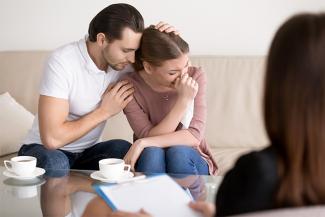
Dr Avinash De Sousa, consultant psychiatrist and psychotherapist, talks about how bereavement counselling has become crucial in the times of Covid -19 to deal with sudden deaths and inability to mourn satisfactorily.
In times of the Covid pandemic, terms like grief therapy and bereavement counselling have gained significance. Could you tell us a little bit about these concepts?
Grief Therapy is a form of therapy which is administered by means of counselling or psychotherapy to an individual who is undergoing grief because of the loss of a loved one. Grief can start even prior to the loss where there is anticipatory grief. The person comes to terms with what is to going to happen and, of course, after the death of a person therapy continues. The counsellor takes him through the entire process of bereavement. Bereavement counselling is to help the person accept, acknowledge and adapt to the grief.
Due to Covid, there have been many instances where families have had to see their loved ones die alone in the hospital. How does one reconcile with such unsettling moments?
One of the things an individual has to understand is that there could be times in one’s life, not only during Covid, where you have a family member who is travelling and death occurs there or you are travelling and family member dies back home. So there may be instance when you may not be present at the time of death. There are also instances as such times that make you feel you’ve probably not given enough time to the family member prior to death and you feel a certain amount of guilt, a lack of satisfaction with regards to not being with that family member at the time of his or her end. Now the only way to accept is to understand the circumstances and the condition demanded you could not be there. That it was not your fault. You cannot live with the guilt and have to get rid of the self-reproach.
The pandemic has forced people to come to terms with new ways of observing death rites and funerals. Do you think being deprived of such sacrosanct practices can build grief?
The pandemic has definitely deprived many people of going to the last rites of their loved one because of restrictions. It deprives them of these sacrosanct acts of grief. A video recording of the entire funeral can be done which can serve as surrogate, but I don’t think it substitutes for being there. The feeling that you were not able to see the body leave earth can be depressing and painful. In our culture, it is very important that the burning of the body or burial is witnessed as a final journey. If an individual is prevented from performing these last rites, it could cause a lot of worry, anguish and even guilt. I think counselling here could help overcome this void and regret.
One of the hardest challenges is to adjust to the new reality of living in the absence of the near one. How does one develop new ways of connecting with family and friends?
Whenever death occurs, there could be a huge amount of difficulty in trying to understand that the person is no longer there. Filling this void will be gradual. One has to accept that life has to go on. One has to slowly start socialising in a micro manner with new people, connect with family members. Sometimes you may unite in grief with strangers, start new relationships or bonds. It happens at a slow pace initially. It will help you come to terms with the loss over three to six months.
Can grief overwhelm a person’s coping ability and trigger depressive episode? How does one resolve that?
Sometimes grief does not resolve in the three to six months period that it should and continues. It can sometimes coalesce and form a depressive episode which we refer as major depression and/or pathological grief. In such times, the individual needs to immediately seek help from a mental health professional. He may need some medical help to counter and manage the depression, or may also need to undergo 10-12 sessions of counselling to come to terms with major psychosocial factors and grief issues related to the depression.
Due to fear of Covid infection, a bereaved person misses out on the psychological aspect of touch and physical presence. How does one cope best with the loss almost alone?
Yes, during Covid during the entire grief and mourning period relatives can’t meet, they cannot hold/hug each other, they cannot cry together. So this is a big emotional vacuum. In India particularly, people do not hold back from hugging or touching each other in a grief process irrespective of Covid sanctions sometimes. But if it not possible, than I think you have to probably wait for a time where these sanctions are lifted and re-enact or go through the grieving process. There have been instances I know of online condolence meetings and prayers happening, but I don’t think that is a substitute.
With increasing social isolation, how does one provide social support to a friend or family going through bereavement?
I think the only way to provide social support to a person going through a grief process is to listen to the individual, allow the individual to express what he or she feels, express what you felt about the individual who has passed away. Talking about these issues, being very vocal about them, expressing your emotions in whatever way you can, I think that is only way you will be able to express your solidarity. One may communicate via video calling if needed.
What do you tell a person who has lost someone to Covid?
Well, I think the process of grieving and expressing is the same in what would happen in any other situations, except for the fact that you give them solace in telling them that this was a disorder which took away the individual, it was a disorder which was beyond and above anyone’s control. The world across is facing deaths due to this. There are a lot of people around us who are dying. It is sad but the person who died is the one of many deaths that have happened. There are many others families in grief. But, yet, that does not take away the personal loss of losing a loved one to Covid.
Which forms of grief counselling have you been required to employ most extensively during Covid times?
The forms of grief therapy which will be applied to Covid includes resolving the grief, speaking about the entire death process, exploring issues related to death, speaking about relationships with the deceased, unresolved issues with the deceased. So focussing on all these aspects of grief therapy would help during the Covid scenario.
Could you give us a few reasons why a dedicated grief therapist is the need of the hour?
We do need a dedicated grief therapist because certain aspects of grief have to be handled either in an individual setting or in a group setting. In a pandemic sometimes, you may have group therapy to deal with the grief. Survivors of those who have lost someone to Covid infection may be counselled in a group that’s where you may need a dedicated grief therapist. Grief therapists could also help train other mental health professionals because the number of death is so many.
Please share a personal experience with grief therapy during COVID?
One of my friends referred a patient to me who had lost her mother to COVID. The girl who lost her mother was 28 years old and was staying in Delhi for work. She came via road back to Mumbai but missed the funeral and her mother’s last rites were performed by the other family members. She had a huge regret as she had not seen her mother in 3 months and would video call her regularly till she was admitted with these complications and could no longer speak on the phone. She had the guilt of not being with her mother during the last days and felt she had failed herself as a daughter. I met her, assessed and started her sessions of therapy and helped her negotiate these grief issues over 8 sessions of therapy.







